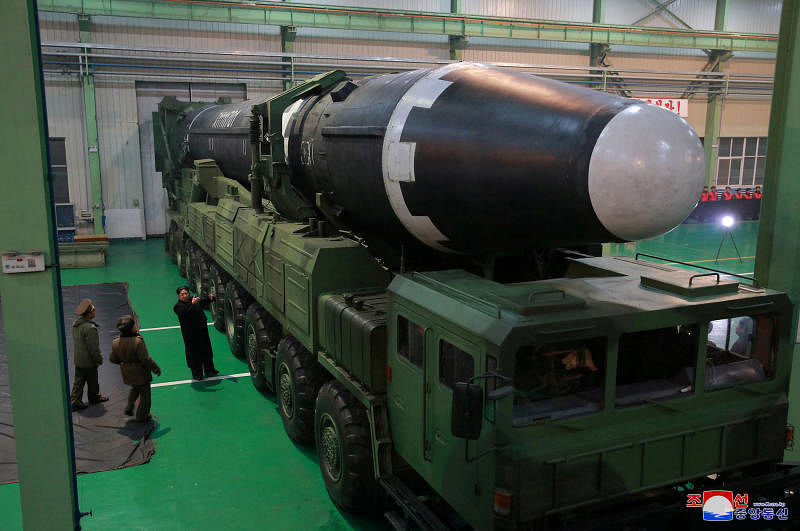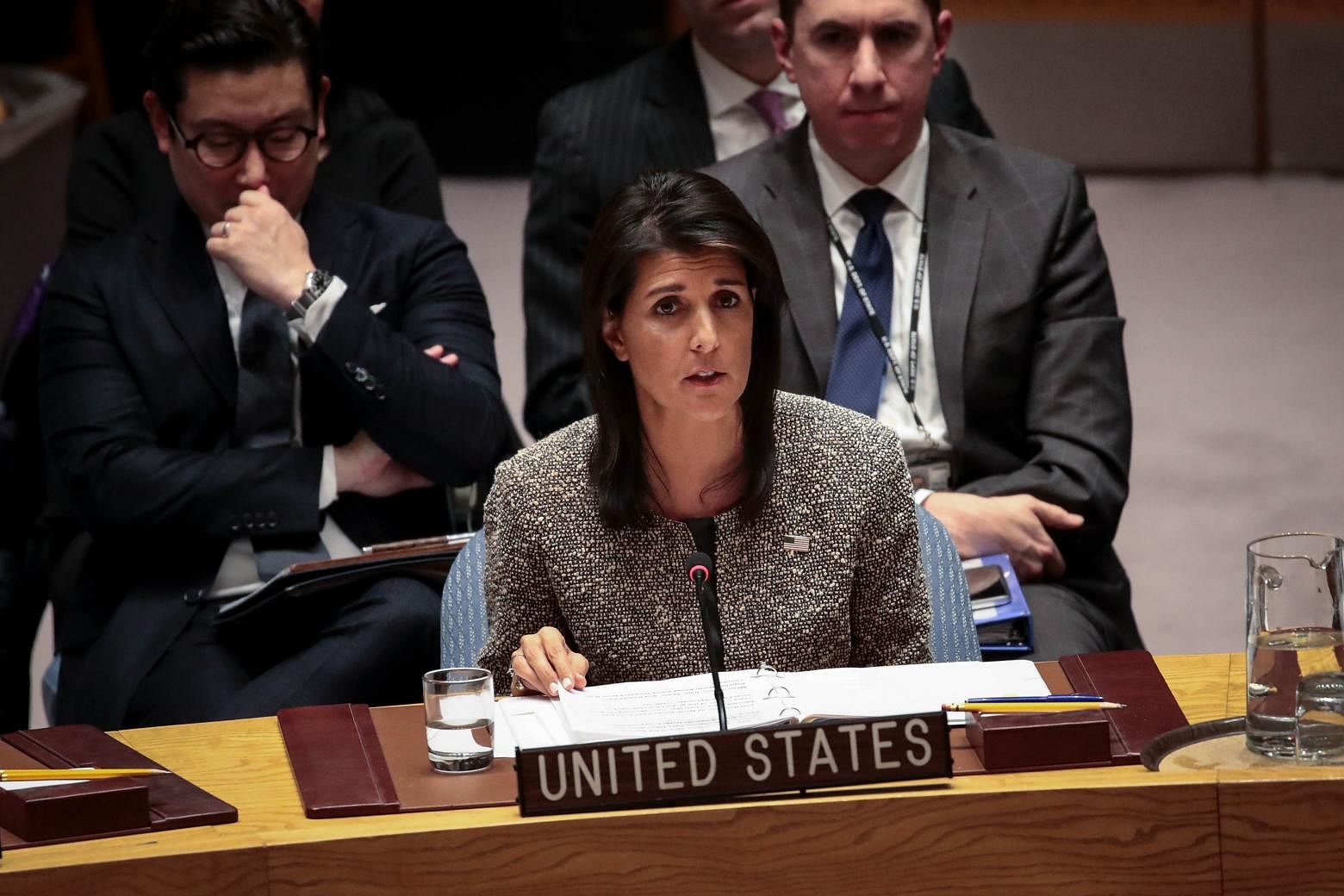US urges all countries to cut off ties to North Korea, in response to latest ballistic missile test
Sign up now: Get ST's newsletters delivered to your inbox
UNITED NATIONS, United States (AFP, Reuters) - The United States is calling on the international community to cut all diplomatic and trade ties with North Korea - including Chinese oil shipments to Pyongyang after a groundbreaking missile test by the pariah regime.
Washington urged tough action as emergency talks on the North's latest provocation opened in the UN Security Council on Thursday (Nov 30) morning - and after US President Donald Trump derided Kim Jong Un as a "sick puppy" and threatened "major" new sanctions.
Pyongyang on Wednesday tested its third intercontinental ballistic missile (ICBM) - which it claimed was capable of striking anywhere in the United States - snapping a two-month pause in missile launches.
North Korean leader Kim said the test of the Hwasong-15 weapons system had helped his country achieve the goal of becoming a full nuclear power, as the international community expressed outrage. The North Korean state media released photos of the launch on Thursday (Nov 30) morning.
"We call on all nations to cut off all ties with North Korea," Washington's ambassador to the United Nations, Nikki Haley, told her fellow envoys.
Haley said Trump had called Chinese President Xi Jinping and urged him to "cut off the oil from North Korea.
"That would be a pivotal step in the world's effort to stop this international pariah," she said, issuing a stern warning to Kim. "If war comes, make no mistake: The North Korean regime will be utterly destroyed," she said.
The UN Security Council was meeting at the request of the United States, Japan and South Korea to consider next steps after three rounds of sanctions adopted in the past year failed to push North Korea to change course.
Canada's CBC news website reported in an exclusive article on Wednesday (Nov 29) that Canada has set aside two bunkers at military bases amid the growing threat of a North Korean missile striking Canada.
It reported that the growing threat from Pyongyang has prompted federal officials to adopt a Cold War defensive posture and in some cases revise a series of critical contingency plans, including one that involves the evacuation of the federal cabinet to a secure military base outside of Ottawa.
An international meeting in Canada in January is designed to produce "better ideas" to ease tensions over Pyongyang's nuclear and ballistic missile tests, Canadian officials said on Wednesday, although North Korea itself will not be invited.

France's UN Ambassador Francois Delattre said the council should respond with a "tightening of the sanctions" - a move that would likely entail the adoption of a new sanctions resolution.
Japanese Ambassador Koro Bessho said "the international community has to keep the pressure up".
Earlier, Trump - who had traded barbs with Kim for months - had asked Xi to use "all available levers" to press the hermit state. "Additional major sanctions will be imposed on North Korea today.
This situation will be handled!" Trump said on Twitter.
Last week, Trump announced new US unilateral sanctions on Pyongyang and returned it to a US list of state sponsors of terror. US Secretary of State Rex Tillerson has called for "additional measures" to toughen up international sanctions, including allowing countries to intercept vessels carrying goods to and from North Korea.
There are concerns in Seoul that Trump might be considering military action against the North that could trigger a full-scale war. Seoul is home to 10 million people and only about 50 km from the border - well within range of Pyongyang's artillery.

HISTORIC CAUSE
Wednesday's missile was more sophisticated than any previously tested, state media said.
"The ICBM Hwasong-15 type weaponry system is an intercontinental ballistic rocket tipped with super-large heavy warhead which is capable of striking the whole mainland of the US," the North's official news agency KCNA said.

North Korean state television brought out Ri Chun Hee, a star presenter who only appears for significant developments, to announce the landmark.
"Kim Jong Un declared with pride that now we have finally realized the great historic cause of completing the state nuclear force, the cause of building a rocket power," she said.
France's UN Ambassador Francois Delattre said the Security Council should respond with a "tightening of the sanctions" - a move that would likely entail the adoption of a new sanctions resolution.
US Secretary of State Rex Tillerson has called for "additional measures" to toughen up international sanctions, including allowing countries to intercept vessels carrying goods to and from North Korea.
Japanese Ambassador Koro Bessho said "the international community has to keep the pressure up so that North Koreans will understand that they need to change their course."
Over the past year, the council has adopted three rounds of sanctions aimed at choking off revenue to Pyongyang's military programmes.
These include a ban on North Korean exports of coal, iron, lead, textiles and seafood, trade restrictions and the blacklisting of a number of North Korean entities and officials.
The council has also banned the hiring of North Korean guest workers and capped oil exports, in particular from China, Pyongyang's main trading partner.
Russia called the launch "provocative" and China, North Korea's sole major ally and diplomatic protector, expressed "grave concern and opposition".
Beijing once again pressed its proposal that the North stop missile and nuclear tests in exchange for a freeze of US military exercises.
Washington has repeatedly rejected the proposal.
GLOBAL STRIKE THREAT
Pyongyang said the missile reached an altitude of 4,475km and splashed down 950km from its launch site.
At least one Western expert said the missile's lofted trajectory suggested an actual range of 13,000km - enough to hit every major US city.
David Wright, an arms control expert and co-director at the Union of Concerned Scientists, said the flight parameters of Wednesday's test pointed to a missile with "more than enough range to reach Washington DC, and in fact any part of the continental United States."
While Pyongyang has yet to prove its mastery of the re-entry technology required to bring a warhead back through the Earth's atmosphere, experts believe it is at least on the threshold of developing a working intercontinental nuclear strike capability.
In September, Pyongyang conducted its sixth and most powerful nuclear test and then fired an intermediate-range missile over Japan.
Trump spoke by phone with both Japanese Prime Minister Shinzo Abe and South Korean President Moon Jae-In after Wednesday's test to underline the global threat.
Trump is close to Abe, but relations with his South Korean counterpart - whom he has accused of appeasing Pyongyang - are far cooler, and there are concerns in Seoul that the US president might be considering military action against the North that could trigger a full-scale war.
Raft of past sanctions
Over the past year, the UN Security Council has imposed biting sanctions on Pyongyang aimed at choking off revenue to its military programmes.
These include a ban on North Korean exports of coal, iron, lead, textiles and seafood, trade restrictions and the blacklisting of a number of North Korean entities and officials. The council has also banned the hiring of North Korean guest workers and capped oil exports, in particular from China, Pyongyang's main trading partner.
Russia called the launch "provocative" and Beijing expressed "grave concern and opposition." China once again pressed its proposal that the North stop missile and nuclear tests in exchange for a freeze of US military exercises - a proposal Washington has repeatedly rejected.


